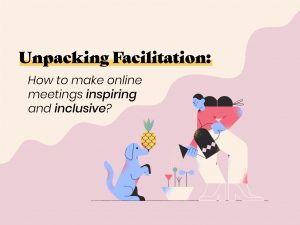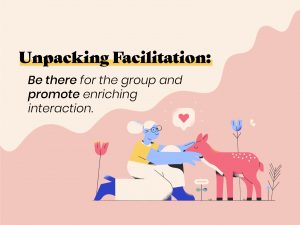Scroll to top
It’s tempting to choose the quick and easy – but is it really worthwhile?
When the situation is on, so to speak, we tend to find a quick and easy-to-implement solution to the situation. It’s about survival and reflexive action. This skill has helped us humans develop and survive. But how should we deal with that tendency when it comes to a challenge in the culture at work? For example, when there is unwanted behavior in the community, when cooperation is not seamless, or when the pressure for development and change is intense? Does quick and easy help then? It is very likely not, because the challenges on this scale are multidimensional, and in order to resolve them require both joint development time of experts, and space for one’s own ideas to grow, encouraged by ideas from others. Are you taking time for co-creation and organizing the time needed for thinking in your organization, or do you fall into the trap of trying the quick and easy, and blaming the rush and hurry?
Optimizing resource efficiency in Kaizen workshops
The efficiency ideal of today’s working life has pushed many companies and communities into a situation where maximizing time use precedes everything. We live in an illusion that when calendars are full, the activities and operations must be efficient and productive. And then we even report everyone’s actions cross the organization so that the use of time is transparent to others as well. In this resource efficiency approach, we forget to ensure the efficiency of operations, i.e., are the activities actually delivering value, and above all whether creative thinking necessary for problem solving is possible this way. We all do realize, that in a hurry you seldomly create the best solutions and generate those necessary ideas and insights for change.
Logically, it should be easy to miss the temptation to go for the first solution quickly squeezed out of the group, as it is often still raw and unfinished. But if you have a resource efficiency mindset, i.e. calendars are filled with status meetings and, at worst, unplanned and unproductive meetings, how can you start solving the challenges of the operating culture through deeper and more effective measures?
In order to secure time for solving challenges in operating culture, not just now but continuously, first we need to understand where the time really goes at work. What activities really bring value to the company and its customers, and what is just a waste. Lean Kaizen workshops and Shingo value stream map created in them are a brilliant method for this. During Kaizen workshop the experts are solving the commonly framed problem or developing current situation while they learn the principles of Lean thinking, which they can continue to apply every day at work. In case resource efficiency thinking is kicking in here, these workshops can be carried out as very tight 0,5-2 day workshop, but by allowing participants more time on the important issue will certainly produce more advanced solutions and start a journey of change in operating culture in a more binding and idea-rich way. When the Kaizen workshop is combined with a three-dimensional and creative LEGO® Serious Play® method, the joint change will be described both as value chain and a change story that is taking into account, for example, how unwanted behavior is addressed and what desired behavior looks like, or what seamless cooperation looks like in everyday life, or what are the main changes needed to improve the current situation.
Are you looking for the quick and easy solution to every challenge? If you feel that it would be wiser to appreciate the expertise and ability of experts to make better and more far-reaching decisions, we are here for you. We will support and guide you on the development of the operating culture. In cooperation, we ensure that experts spend time on exactly what is most valuable to both your organization and the customer. It has also been studied that this supports employees’ own comfort.
This blog continues the series of blogposts on facilitation and coaching in process development and operating culture context. Stay tuned for more and let us know what topics you would like to hear about in the coming blogposts.





